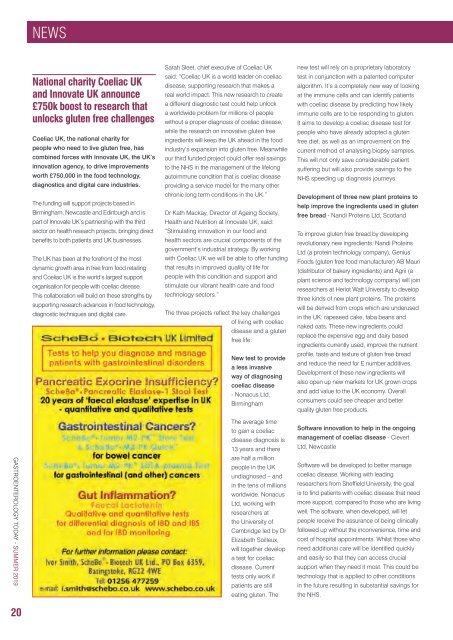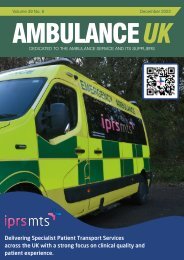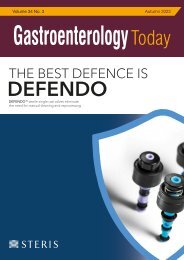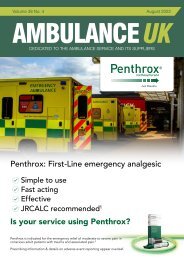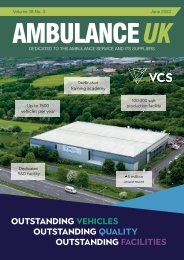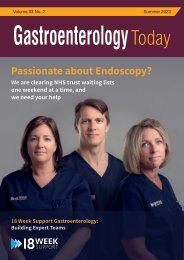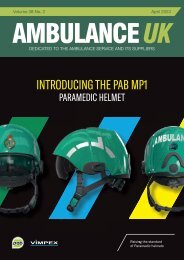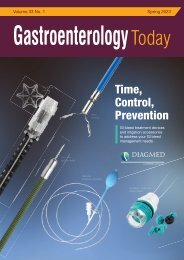You also want an ePaper? Increase the reach of your titles
YUMPU automatically turns print PDFs into web optimized ePapers that Google loves.
NEWS<br />
National charity Coeliac UK<br />
and Innovate UK announce<br />
£750k boost to research that<br />
unlocks gluten free challenges<br />
Coeliac UK, the national charity for<br />
people who need to live gluten free, has<br />
combined forces with Innovate UK, the UK’s<br />
innovation agency, to drive improvements<br />
worth £750,000 in the food technology,<br />
diagnostics and digital care industries.<br />
The funding will support projects based in<br />
Birmingham, Newcastle and Edinburgh and is<br />
part of Innovate UK’s partnership with the third<br />
sector on health research projects, bringing direct<br />
benefits to both patients and UK businesses.<br />
The UK has been at the forefront of the most<br />
dynamic growth area in free from food retailing<br />
and Coeliac UK is the world’s largest support<br />
organisation for people with coeliac disease.<br />
This collaboration will build on these strengths by<br />
Sarah Sleet, chief executive of Coeliac UK<br />
said: “Coeliac UK is a world leader on coeliac<br />
disease, supporting research that makes a<br />
real world impact. This new research to create<br />
a different diagnostic test could help unlock<br />
a worldwide problem for millions of people<br />
without a proper diagnosis of coeliac disease,<br />
while the research on innovative gluten free<br />
ingredients will keep the UK ahead in the food<br />
industry’s expansion into gluten free. Meanwhile<br />
our third funded project could offer real savings<br />
to the NHS in the management of the lifelong<br />
autoimmune condition that is coeliac disease<br />
providing a service model for the many other<br />
chronic long term conditions in the UK.”<br />
Dr Kath Mackay, Director of Ageing Society,<br />
Health and Nutrition at Innovate UK, said:<br />
“Stimulating innovation in our food and<br />
health sectors are crucial components of the<br />
government’s industrial strategy. By working<br />
with Coeliac UK we will be able to offer funding<br />
that results in improved quality of life for<br />
people with this condition and support and<br />
stimulate our vibrant health care and food<br />
technology sectors.”<br />
supporting research advances in food technology,<br />
Gastro<strong>Today</strong>_Jan_<strong>2019</strong>_v4 26/01/<strong>2019</strong> 09:39 Page 1<br />
diagnostic techniques and digital care.<br />
The three projects reflect the key challenges<br />
of living with coeliac<br />
disease and a gluten<br />
free life:<br />
New test to provide<br />
a less invasive<br />
way of diagnosing<br />
coeliac disease<br />
- Nonacus Ltd,<br />
Birmingham<br />
new test will rely on a proprietary laboratory<br />
test in conjunction with a patented computer<br />
algorithm. It’s a completely new way of looking<br />
at the immune cells and can identify patients<br />
with coeliac disease by predicting how likely<br />
immune cells are to be responding to gluten.<br />
It aims to develop a coeliac disease test for<br />
people who have already adopted a gluten<br />
free diet, as well as an improvement on the<br />
current method of analysing biopsy samples.<br />
This will not only save considerable patient<br />
suffering but will also provide savings to the<br />
NHS speeding up diagnosis journeys.<br />
Development of three new plant proteins to<br />
help improve the ingredients used in gluten<br />
free bread - Nandi Proteins Ltd, Scotland<br />
To improve gluten free bread by developing<br />
revolutionary new ingredients. Nandi Proteins<br />
Ltd (a protein technology company), Genius<br />
Foods (gluten free food manufacturer) AB Mauri<br />
(distributor of bakery ingredients) and Agrii (a<br />
plant science and technology company) will join<br />
researchers at Heriot Watt University to develop<br />
three kinds of new plant proteins. The proteins<br />
will be derived from crops which are underused<br />
in the UK: rapeseed cake, faba beans and<br />
naked oats. These new ingredients could<br />
replace the expensive egg and dairy based<br />
ingredients currently used, improve the nutrient<br />
profile, taste and texture of gluten free bread<br />
and reduce the need for E number additives.<br />
Development of these new ingredients will<br />
also open up new markets for UK grown crops<br />
and add value to the UK economy. Overall<br />
consumers could see cheaper and better<br />
quality gluten free products.<br />
GASTROENTEROLOGY TODAY - SUMMER <strong>2019</strong><br />
The average time<br />
to gain a coeliac<br />
disease diagnosis is<br />
13 years and there<br />
are half a million<br />
people in the UK<br />
undiagnosed – and<br />
in the tens of millions<br />
worldwide. Nonacus<br />
Ltd, working with<br />
researchers at<br />
the University of<br />
Cambridge led by Dr<br />
Elizabeth Soilleux,<br />
will together develop<br />
a test for coeliac<br />
disease. Current<br />
tests only work if<br />
patients are still<br />
eating gluten. The<br />
Software innovation to help in the ongoing<br />
management of coeliac disease - Cievert<br />
Ltd, Newcastle<br />
Software will be developed to better manage<br />
coeliac disease. Working with leading<br />
researchers from Sheffield University, the goal<br />
is to find patients with coeliac disease that need<br />
more support, compared to those who are living<br />
well. The software, when developed, will let<br />
people receive the assurance of being clinically<br />
followed up without the inconvenience, time and<br />
cost of hospital appointments. Whilst those who<br />
need additional care will be identified quickly<br />
and easily so that they can access crucial<br />
support when they need it most. This could be<br />
technology that is applied to other conditions<br />
in the future resulting in substantial savings for<br />
the NHS.<br />
20


